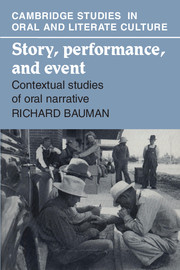2 - “Any man who keeps more'n one hound'll lie to you”
A contextual study of expressive lying
Published online by Cambridge University Press: 05 June 2012
Summary
“There are two kinds of tales, one true and the other false,” Socrates proposes to Adeimantos in the course of exploring the proper place of literature in The Republic (376e), and the truth value of narrative – one dimension of the relationship of stories to the events they recount – has been a basic typological criterion in the classification of narrative ever since. Folklorists, for their part, have relied rather heavily on the truth factor in classifying oral narrative forms. For some, the basic distinction rests on “the extent to which a narrative is or is not based upon objectively determinable facts” (Littleton 1965:21), whereas others are more pragmatic and relativistic, relying on local distinctions made by members of the societies in which the tales are told between “narratives regarded as fiction” and “narratives … regarded as true by the narrator and his audience” (Bascom 1965:4).
Recently, however, there have been increasing expressions of unease about the empirical basis and reliability of such truth-value criteria. Herbert Halpert, for example, reports frequent baffled disagreement between himself and his students in the application of the truth–fiction distinction to the sorting out of jests and anecdotes, local legends, tall tales, and personal narratives (1971:51). Robert Georges, in turn, sees the truth–fiction question as so empirically clouded in actual cases that “the only meaningful answer would have to be an ambivalent one” (1971:17, emphasis in the original).
- Type
- Chapter
- Information
- Story, Performance, and EventContextual Studies of Oral Narrative, pp. 11 - 32Publisher: Cambridge University PressPrint publication year: 1986
- 2
- Cited by

